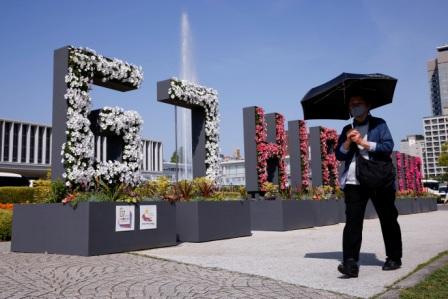The most symbolic element of the just concluded G7 summit in Hiroshima is that it took place in the city which, along with Nagasaki, are the only places in the world that had actually experienced the horrors that nuclear weapons can cause. A key agenda of the summit was the ongoing Russia-Ukraine war in which Russia has been constantly threatening use of its nuclear power to crush Ukraine. Some of the survivors of the nuclear attack on Hiroshima in 1945, who were interviewed by the international media on the occasion, cautioned the world against a second nuclear holocaust citing the horrific sufferings they and their families had suffered in 1945.
Ukraine’s President Volodymyr Zelenskyy, who was invited to the summit, has for some time been performing shuttle diplomacy visiting countries in Europe and the Middle East. His presence at the G7 meeting certainly put some pressure on the countries of the block – the US, UK, France, Germany, Italy, Canada and Japan to rally behind Ukraine in a more effective manner to confront Russia. In fact, it has increasingly become clear to Zelenskyy that it is not enough to get the West’s support to his country in the fight against Russia. He also needs to convince countries, including India, which have close ties with Russia for supply of food and arms, to force Russia to stop the war. It is this reason which prompted Zelenskyy to meet Indian Prime Minister Narendra Modi on the sidelines of the summit so as to impress on him the need to support his country. It is to be noted that India has, till date, avoided any condemnation of Russia’s invasion.
That the G7 summit made the Ukraine-Russia war a top item on its agenda became clear when the US President Joe Biden announced that his administration had given the go ahead for training of Ukrainian pilots in the use of US made F16 fighter jets. In fact, Zelenskyy’s in-person attendance at one of the world’s premier diplomatic gatherings is meant to galvanize attention on his country’s 15-month fight against Russia. Even before he landed in Japan, the G7 nations had unveiled a slew of new sanctions and other measures meant to punish Moscow and hamper its war-fighting abilities.
It is this support that caused worries to both Russia and China. Russian Foreign Minister Sergey Lavrov criticized the G7 summit for aiming to isolate both China and Russia. The task, he charged, had been set “loudly and openly” to defeat Russia on the battlefield, and then eliminate it as a geopolitical competitor. He went further to complain that the decisions taken at the summit were aimed at “the double containment of Russia and China.”
China followed up Russia’s belligerent response with an open threat to the bloc not to try to intimidate it. China’s Foreign Ministry said time has changed and a handful of Western countries can no longer meddle in other countries’ internal affairs and manipulate global affairs. In an unambiguous statement China has warned the G7 members to stop ganging up to “bludgeon other countries” and asked it to focus on addressing the various issues confronting the world.
Though the G7 summit had no specific agenda on China, the very fact that it was held in Japan and leaders of the Quad grouping – US, Japan, India and Australia – also had a meeting sent a clear message to China that they would resist any Chinese attempt to forcibly take over Taiwan. While this was happening, the 18th India-China Corps Commander level meeting had a proposal pushed by China’s PLA to create a 15-20 km wide Buffer zone between the two militaries. It may be noted that this whole area where China proposes the buffer zone is totally Indian territory, as claimed by sources.
There are deep lessons for India to learn from this Hiroshima meeting. Russia’s invasion of Ukraine should impart the greatest learning. The inherent strength of a socially united country which had built its own military strength has helped sustain Ukraine to survive the terrible might of one of the world’s most powerful armed forces for over a year. Only after it demonstrated to the world that it could withstand the invasion did friendly nations pitched in to help. US is now saying it will train Ukranian pilots to fly F 16 jets. This help comes after more than one year of bitter war.
India has remained steadfast in its stand not to condemn the Russian invasion. Although no one has bothered to complain, the cold shouldering of India at this G-7 meet was palpable. This might have serious fall out for India in the future should China ever increase its belligerence towards India. Without strengthening the Indian military while joining Quad, the nation might be inviting trouble from the neighborhood. If China decides to undertake large scale military action against India, help from outside might be slow or extremely delayed in landing up. India’s stand in relation to the Russian invasion of Ukraine may not be forgotten by the Western Bloc easily in the near future. India’s diplomacy can no longer be person centric. There is no proof of it having paid any dividends yet. Rather it is on the contrary.
